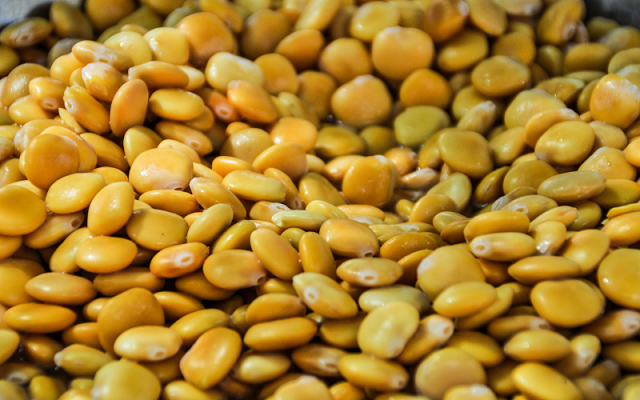The debate between coffee and tea Lupin raises interesting questions about our consumption habits and our health. In this article, we will explore the advantages and disadvantages of these two beverages, focusing on their impacts on our well-being and the environment. Discover how lupin could be an interesting alternative to traditional coffee.
After reading this article, you will have:
- a deep understanding of the differences between coffee and lupin ;
- information on the health and environmental impacts of these two beverages ;
- tips for incorporating lupin into your daily routine ;
- A new perspective on your consumption habits.
Coffee: A Popular but Controversial Beverage
The coffee, this iconic beverage that sets the rhythm of our mornings and punctuates our days holds a central place in our Western culture. A symbol of friendliness and productivity, it has become a daily ritual for millions of people around the world. However, behind its captivating aroma and much-appreciated stimulating effect lie less glamorous aspects that deserve our attention.
This millennia-old beverage, originating from the highlands of Ethiopia, has gradually established itself as a pillar of our modern society. Its ability to bring people together and provide us with a quick boost has made it a valuable ally in our busy lives. However, as we sip a good cup of our morning espresso or enjoy a cappuccino with friends, it is crucial to take a step back and examine the broader implications of this deeply ingrained habit.
In this section, we will explore the multiple facets of coffee, ranging from its effects on our health to its environmental impact. We will see how this beverage, despite its undeniable popularity, raises important questions regarding our well-being and the sustainability of our consumption choices. This analysis will allow us to take a fresh look at our relationship with coffee and consider potential alternatives that are more in line with a holistic approach to health and the environment.
The effects of coffee on our health
Coffee, although appreciated for its distinctive taste and stimulating effect, has health benefits that deserve to be highlighted and side effects that are important to be aware of.
Let's start with the positive effects. Coffee contains antioxidants that can help reduce the risk of certain chronic diseases. Some studies have suggested that moderate coffee consumption may be associated with a reduced risk of type 2 diabetes, cardiovascular diseases, and certain types of cancer.
However, the disadvantages of coffee on our nervous system are numerous and deserve special attention. Caffeine, the main active component of coffee, can have harmful effects on our nervous balance. Excessive consumption can lead to anxiety, tremors, irritability, and heart palpitations. Additionally, caffeine can disrupt the sleep cycle, leading to insomnia or lower quality sleep.
The impact of coffee on stress is particularly concerning. Although often consumed to increase alertness and productivity, coffee can actually exacerbate stress. Caffeine stimulates the production of cortisol, the stress hormone, which can amplify feelings of anxiety and tension. A study published in the Journal of Psychopharmacology has demonstrated that regular coffee consumption can increase perceived stress levels, especially in already stressful situations.
Regarding sleep, caffeine can significantly disrupt our circadian rhythm. According to research published in Science Translational Medicine, The consumption of coffee, even 6 hours before bedtime, can delay our internal biological clock by nearly 40 minutes. This can lead to difficulties falling asleep and reduce overall sleep quality.
It is important to note that the effects of coffee vary significantly from person to person. Some individuals are more sensitive to caffeine and may experience these negative effects even with moderate consumption. Others may develop a tolerance over time, requiring higher doses to achieve the same stimulating effect, which can increase the risk of side effects.
In conclusion, although coffee may offer certain health benefits, its effects on our nervous system, stress levels, and sleep are aspects to be seriously considered. For those looking to reduce their coffee consumption or find a good alternative that is gentler on their nervous system, exploring options like Lupin could be a beneficial approach for their overall well-being.
The culture of coffee: an environmental issue
Coffee, although appreciated worldwide, raises important questions regarding its environmental impact. This traditional drink, originating from tropical regions, has a significant ecological footprint that deserves our attention.
The coffee plant, a shrub that produces our precious coffee beans, is primarily cultivated in the "coffee belt", a geographical area located between the Tropics of Cancer and Capricorn. This specific location often involves a long supply chain to transport coffee to our cups, thereby contributing to greenhouse gas emissions related to transportation.
Intensive coffee cultivation also poses major environmental challenges. The increasing demand has led to the deforestation of vast tropical areas to create plantations. According to a study published in the journal "Nature"In 2019, coffee production was responsible for the loss of more than 100,000 hectares of tropical forest each year, threatening local biodiversity and contributing to climate change."
Moreover, conventional coffee cultivation often requires the intensive use of pesticides and chemical fertilizers. These practices not only pollute the soil and water but also affect the health of agricultural workers. A study conducted by the University of São Paulo in 2020 revealed that pesticide residues in coffee-growing areas in Brazil frequently exceeded the limits recommended by the World Health Organization.
Water consumption is another concerning aspect. The production of a single cup of coffee requires approximately 140 liters of water, from cultivation to processing.. In regions already facing water stress, this demand for water can exacerbate issues of scarcity and conflicts related to water access.
Finally, the roasting process, essential for developing the aroma and flavor of coffee, consumes a significant amount of energy. A 2018 study by the University of Michigan estimated that roasting one kilogram of coffee generates an average of 15.33 kg of CO2, thus significantly contributing to the overall carbon footprint of this beverage.
In the face of these environmental challenges, it becomes crucial to rethink our consumption habits and consider more sustainable alternatives. Options like lupin, locally grown in Europe, could offer a more environmentally friendly solution while meeting our needs for comforting and energizing beverages.
By becoming aware of the ecological impact of coffee, we are better equipped to make informed choices that align our daily consumption with our environmental values. Explore alternatives, such as the Lupin can be a step towards a more sustainable and responsible approach to our eating habits.
Lupin: A Promising European Alternative
Lupin, belonging to the legume family, is a plant with colorful flowers that is increasingly positioning itself as a fascinating and promising alternative café. Cultivated for centuries in Europe, lupin offers not only a local and sustainable option but also a beverage with remarkable nutritional properties, without the drawbacks associated with caffeine.
Originally from the Mediterranean basin, lupin has long been valued for its protein-rich seeds. Today, it is reinventing itself as a modern beverage, catering to consumers who are health-conscious and environmentally aware. Unlike coffee, lupin does not contain stimulating substances, making it an ideal option for those looking to reduce their caffeine intake without sacrificing the enjoyment of a warm and comforting drink.
One of the most interesting aspects of lupin is its versatility. It can be prepared in various ways to create drinks that resemble the taste and texture of coffee, while offering a unique nutritional profile. For example, the Lupin coffee Tikawa, available in the classic version, is distinguished by its subtle taste and creamy texture, offering a particularly appreciated caffeine-free alternative. This adaptability, combined with its health and environmental benefits, positions the Lupin like a excellent alternative to coffee, capable of seducing even the most demanding coffee enthusiasts.
The health benefits of lupin
- Lupin, this little-known legume, is full of health benefits. Its exceptional nutritional value makes it an ideal ally for those looking to adopt a healthier diet, without giving up the pleasure of a warm and comforting drink.
- Rich in high-quality plant proteins, lupin contains all the essential amino acids that our body needs. A study published in the "Journal of Agriculture and Food Chemistry" in 2017 showed that lupin proteins are easily digestible and assimilable by the body, making them a excellent source of protein for vegetarians and vegans.
- Unlike coffee, lupin is presented as a caffeine-free coffee, offering neither caffeine nor other stimulating substances. This absence of stimulating effects makes it an ideal option for those who wish to reduce their coffee consumption without sacrificing their morning ritual. Lupin helps maintain a natural balance of the nervous system, promoting better quality sleep and more effective management of daily stress.
- Lupin, in addition to being a valuable source of dietary fiber essential for good digestive health, offers another benefit for those who suffer from acid reflux. Unlike caffeinated drinks that can worsen this issue, Lupin does not irritate the stomach, making it a gentler option for the digestive system. A study published in the "European Journal of Nutrition"In 2019, it was demonstrated that regular consumption of lupin can help improve intestinal transit and nourish the gut microbiota, thereby promoting better overall health."
- Lupin is naturally rich in minerals such as Iron, the magnesium and the Potassium. These nutrients play a crucial role in many bodily functions, including energy production, maintaining good cardiovascular health, and supporting the immune system. A study published in "Nutrients"in 2020 highlighted the potential of lupin for improve natural vitality and reduce chronic fatigue.
- Lupin presents a low glycemic index, making it an interesting option for people concerned about controlling their blood sugar levels. Research published in the "British Journal of Nutrition"In 2018, it was demonstrated that regular consumption of lupin can contribute to better weight management and the prevention of type 2 diabetes."
By integrating the Lupin In your daily diet, you can benefit from its many nutritional advantages while reducing your dependence on coffee. This transition to a healthier and more natural beverage can help improve your overall well-being by promoting a stable energy balance throughout the day, without the spikes and crashes often associated with caffeine consumption. We even created an ebook of recipes to add lupin to your daily meals! You can download it here: TIKAWA Recipe Ebook !
The cultivation of lupin: a sustainable choice
Lupin, as a European alternative to coffee, offers many advantages in terms of sustainability and environmental impact. Unlike coffee, which requires specific tropical conditions, lupin is perfectly suited to the European climate, making it a local and more environmentally friendly crop.
Ecological benefits of lupin
The cultivation of lupin in Europe offers several significant benefits for the environment:
- Reduction of CO2 emissions
- Local production reducing transportation distances
- Reduction of the carbon footprint
- Water conservation
- Drought-resistant plant
- Reduced need for irrigation
- Improvement of soil quality
- Atmospheric nitrogen fixation in the soil
- Reduction in the need for chemical fertilizers
- Promotion of biodiversity
- Crop diversification
- Support for local ecosystems
Environmental challenges of coffee cultivation
In comparison, coffee cultivation presents several issues:
- Deforestation in tropical areas
- Intensive use of pesticides harmful to the environment
- High water consumption for cultivation and processing
I'm sorry, but it seems like your message is incomplete. Could you please provide the text you would like me to translate? Numerical data
Lupin:
- Reduction of greenhouse gas emissions by up to 70% compared to imports of tropical cropsWageningen University)
- Uses 40% less water than other comparable crops (Journal of Agricultural Science)
- 30% increase in the biodiversity of pollinating insects (INRA)
Coffee:
- Responsible for the loss of more than 100,000 hectares of tropical forest each year (FAO)
- Use of 250% more pesticides than legume cropsScience of The Total Environment)
- It requires about 140 liters of water to produce a cup, compared to 30 liters for a lupin-based drink (UNESCO-IHE Institute for Water Education).
By choosing lupin as a coffee substitute, consumers can significantly contribute to reducing their environmental impact while supporting organic, local, and sustainable agriculture.. This transition towards a European culture represents an important step towards a more planet-friendly way of life.
Replacing coffee with lupin: how to go about it ?
The transition from coffee to lupin may seem intimidating at first, especially for those who have developed a well-established routine around their daily cups of coffee. However, with the right approaches and a bit of patience, this change can be not only easy but also enjoyable and beneficial for your health and well-being.
Lupin offers a natural and healthy alternative to coffee, without the drawbacks associated with caffeine. Its unique taste and nutritional richness make it an attractive option for those looking to adopt a more balanced lifestyle. In this section, we will explore practical strategies for incorporating lupin into your daily routine as a replacement for coffee.
It is important to note that switching from coffee to lupin is not just a change of beverage, but also an opportunity to rethink your habits and your relationship with energy drinks. This transition can be an opportunity to discover new flavors, to explore morning rituals healthier, and to experience the benefits of more stable and natural energy throughout the day.
Prepare and enjoy lupin
The preparation of lupin as an alternative to coffee is simple and can become a pleasant ritual in your daily routine. Here are some methods to prepare and enjoy your lupin-based drink :
- Cold brew method:
- Mix 1 to 2 tablespoons of powder of roasted lupin in a glass of cold water.
- Let it rest for 5 to 10 minutes, stirring occasionally.
- Filter if necessary and enjoy as is or with a bit of plant milk.
- Hot preparation:
- Pour hot (not boiling) water over 1 to 2 tablespoons of lupin powder.
- Let steep for 3 to 5 minutes.
- Stir well and enjoy.
- Lupin latte:
- Prepare your lupin base as described above.
- Add hot and frothy plant-based milkalmond, oats, or Tiger nut).
- Sprinkle with cinnamon or of raw cacao for more flavor.
To fully appreciate the unique taste of lupin, here are a few tips:
- Start with small amounts to gradually get used to its flavor.
- Experiment with different proportions of water and lupin powder to find your perfect balance.
- Try adding spices like cinnamon, cardamom, the ginger or vanilla to enhance the flavor.
- Feel free to lightly sweeten with agave syrup or honey if you prefer a milder drink.
- Serve your lupin drink in your favorite cup to maintain the comforting ritual associated with coffee consumption.
Lupin has a naturally sweet and slightly nutty taste, which can be surprising at first. Over time, you will learn to appreciate its subtle nuances and rich flavor. Unlike coffee, lupin does not leave a bitter aftertaste, making it an enjoyable drink to savor throughout the day.
Don't forget that the transition to lupin is also an opportunity to explore new taste sensations and rediscover the pleasure of drinking a hot beverage without the side effects of caffeine. Take the time to savor each sip and focus on the benefits this drink brings to your body and mind.
By incorporating lupin into your routine, you are not only making a healthy choice but also supporting more sustainable and local agriculture. It's a delicious and responsible way to take care of yourself and the planet.
Managing the change of habit
Switching from coffee to lupin represents more than just a change of beverage; it's a true transition in your daily habits. Here are some effective strategies to facilitate this change and seamlessly integrate lupin into your routine:
- Gradual transition: Start by replacing one cup of coffee per day with lupin. Gradually increase over several weeks to allow your body and mind to adapt smoothly.
- Ritualize the moment : Create a new ritual around your lupin drink. Use a beautiful cup, take the time to savor the aroma, and enjoy a moment of calm. This new ritual can become as comforting as your usual coffee break.
- Explore different preparations: Experiment with different ways to prepare your lupin coffee. Try it hot, cold, with spices like cinnamon or vanilla, or even as a plant-based latte to find your favorite preparation.
- Manage withdrawal symptoms: If you experience headaches or fatigue when stopping coffee, feel free to gradually reduce your caffeine consumption. Lupin can help you maintain a stable energy level without the side effects of coffee.
- Find alternatives for stimulation: If you used coffee to stimulate yourself, explore other natural options like a short physical activity session, a cold shower, or a meditation break to boost your energy.
- Educate your surroundings: Share your reasons for switching to lupin with your loved ones. Their support can be valuable in your journey of change.
- Track your progress: Note the changes you observe in your body and mood. This may include a better sleep quality, a reduction of Stress, or more stable energy throughout the day.
- Be patient: Don't forget that changing a habit takes time. Give yourself several weeks to fully adapt to your new lupin routine.
- Stay flexible: It is not necessary to completely eliminate coffee if you enjoy it occasionally. The goal is to find a balance that works for you.
- Celebrate your successes: Each day without coffee is a victory. Reward yourself for your efforts and commitment to a healthier habit.
By adopting these strategies, you will greatly ease your transition to lupin. Not only will you discover a new tasty and healthy beverage, but you will also experience the benefits of a life without caffeine dependency. Remember that every small step counts in your journey towards a more balanced diet that respects your body.
Conclusion
The debate between coffee and lupin offers us a new perspective on our consumption habits and their impact on our health and the environment. While coffee has long been our preferred morning companion, lupin is emerging as a promising caffeine-free alternative, combining nutritional benefits and environmental sustainability.
Lupin offers many advantages over coffee. With the absence of caffeine, it provides stable energy throughout the day, without the spikes and crashes associated with coffee consumption. Rich in plant proteins, fibers, and essential minerals, lupin supports our health in a comprehensive way. Additionally, its cultivation in Europe significantly reduces the carbon footprint related to our consumption, unlike coffee which requires long-distance transportation.
Adopting lupin as an alternative to coffee is not only a healthy choice, but also an environmentally friendly action. By choosing this local legume, we support more sustainable agriculture that respects our ecosystems. The transition may seem challenging, but the long-term benefits for our well-being and our planet are invaluable.
We strongly encourage you to try lupin as a healthy and sustainable alternative to coffee. It's an opportunity to rethink our daily habits and make a more conscious choice for our health and the environment. For those who are curious to discover this innovative beverage, the Tikawa Intense by Biovie offers an excellent introduction to the world of lupin. This product combines the comforting taste of a hot beverage with all the nutritional benefits of lupin, without the drawbacks of coffee.
By choosing lupin, you are not just changing your drink; you are adopting a more balanced and eco-friendly lifestyle. Each cup of lupin is a step towards better personal health and a healthier planet. So, why not start your day tomorrow with a delicious cup of lupin ?
Don't forget to subscribe to our newsletter to receive more information about raw food and healthy alternatives to traditional drinks. Together, let's explore the infinite possibilities of a more conscious and compassionate approach to eating, for ourselves and our environment.
Your questions and our answers (FAQ)
What is lupin and how is it different from coffee ?
Lupin is a legume cultivated in Europe, used as an alternative to coffee. Unlike coffee, lupin does not contain caffeine or other stimulating substances. It offers a drink rich in proteins, fibers, and minerals, without the stimulating effects of coffee on the nervous system.
What are the main health benefits of lupin compared to coffee ?
Lupin offers several health benefits: it does not disrupt sleep or increase stress like coffee can, it is rich in plant proteins and fibers, and has a low glycemic index. Additionally, it promotes stable energy throughout the day without the spikes and crashes associated with caffeine.
Why is lupin cultivation more sustainable than coffee cultivation ?
The cultivation of lupin is more sustainable because it is local in Europe, thus reducing emissions related to transportation. It requires less water and pesticides than coffee and helps improve soil quality. Unlike coffee, lupin cultivation does not cause deforestation in tropical areas.
How can I prepare a lupin-based drink ?
There are several methods for preparing lupin. You can cold brew it by mixing lupin powder with cold water, or prepare it hot like traditional coffee. For a lupin latte, add hot and frothy plant-based milk to your lupin base. Experiment with different spices to find your favorite taste.
Is it difficult to switch from coffee to lupin ?
The transition may take time, but it is entirely achievable. Start by gradually replacing coffee with lupin, create new rituals around your lupin beverage, and be patient with yourself. Over time, you might enjoy the benefits of more stable energy and better sleep.





















